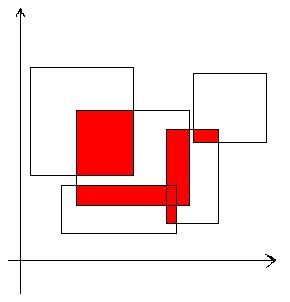hdu 1255 覆盖的面积 线段树求面积的交 我感觉有点难啊~~第一次写这种类型的
覆盖的面积
Time Limit: 10000/5000 MS (Java/Others) Memory Limit: 65536/32768 K (Java/Others)Total Submission(s): 3968 Accepted Submission(s): 1967
Problem Description
Input
输入数据的第一行是一个正整数T(1<=T<=100),代表测试数据的数量.每个测试数据的第一行是一个正整数N(1<=N<=1000),代表矩形的数量,然后是N行数据,每一行包含四个浮点数,代表平面上的一个矩形的左上角坐标和右下角坐标,矩形的上下边和X轴平行,左右边和Y轴平行.坐标的范围从0到100000.
注意:本题的输入数据较多,推荐使用scanf读入数据.
注意:本题的输入数据较多,推荐使用scanf读入数据.
Output
对于每组测试数据,请计算出被这些矩形覆盖过至少两次的区域的面积.结果保留两位小数.
Sample Input
2 5 1 1 4 2 1 3 3 7 2 1.5 5 4.5 3.5 1.25 7.5 4 6 3 10 7 3 0 0 1 1 1 0 2 1 2 0 3 1
Sample Output
7.63 0.00
上博客吧~~我是没能力讲解啊~
http://www.cnblogs.com/ka200812/archive/2011/11/13/2247064.html
代码:
#include <cstdio>
#include <algorithm>
using namespace std ;
double y[2010] ;
struct Line{
double x,y_up,y_down ;
int mark;
}line[2010];
struct node{
double x;
double y_up,y_down;
double cover;
bool isLeaf ;
}st[400100];
void build(int l , int r , int pos)
{
st[pos].x = -1 ;
st[pos].y_down = y[l] ;
st[pos].y_up = y[r] ;
st[pos].cover = 0 ;
st[pos].isLeaf = false ;
if(l+1 == r)
{
st[pos].isLeaf = true ;
return ;
}
int mid = (l+r)>>1 ;
build(l,mid,pos<<1) ;
build(mid,r,pos<<1|1) ;
}
double insert(double x , double y_down , double y_up , int mark , int pos)
{
if(st[pos].y_down>=y_up || st[pos].y_up<=y_down)
{
return 0 ;
}
if(st[pos].isLeaf)
{
if(st[pos].cover>1)
{
double tempx = st[pos].x ;
double area = (x-tempx)*(st[pos].y_up-st[pos].y_down) ;
st[pos].x = x ;
st[pos].cover += mark ;
return area ;
}
else
{
st[pos].cover += mark ;
st[pos].x = x ;
return 0 ;
}
}
return insert(x,y_down,y_up,mark,pos<<1)+insert(x,y_down,y_up,mark,pos<<1|1) ;
}
bool cmp(const Line &a , const Line &b)
{
return a.x<b.x ;
}
int main()
{
int t ;
scanf("%d",&t) ;
while(t--)
{
int n ;
scanf("%d",&n) ;
int index = 0 ;
for(int i = 0 ; i < n ; ++i)
{
double x1 , x2 , y1 , y2 ;
scanf("%lf%lf%lf%lf",&x1,&y1,&x2,&y2) ;
line[index].x = x1 ;
line[index].y_down = y1 ;
y[index] = y1 ;
line[index].y_up = y2 ;
line[index++].mark = 1 ;
line[index].x = x2 ;
line[index].y_down = y1 ;
line[index].y_up = y2 ;
y[index] = y2 ;
line[index++].mark = -1 ;
}
sort(line,line+index,cmp);
sort(y,y+index) ;
build(0,index-1,1) ;
double s = 0.0 ;
for(int i = 0 ; i < index ; ++i)
{
s += insert(line[i].x,line[i].y_down,line[i].y_up,line[i].mark,1) ;
}
printf("%.2lf\n",s) ;
}
return 0 ;
}
与君共勉
